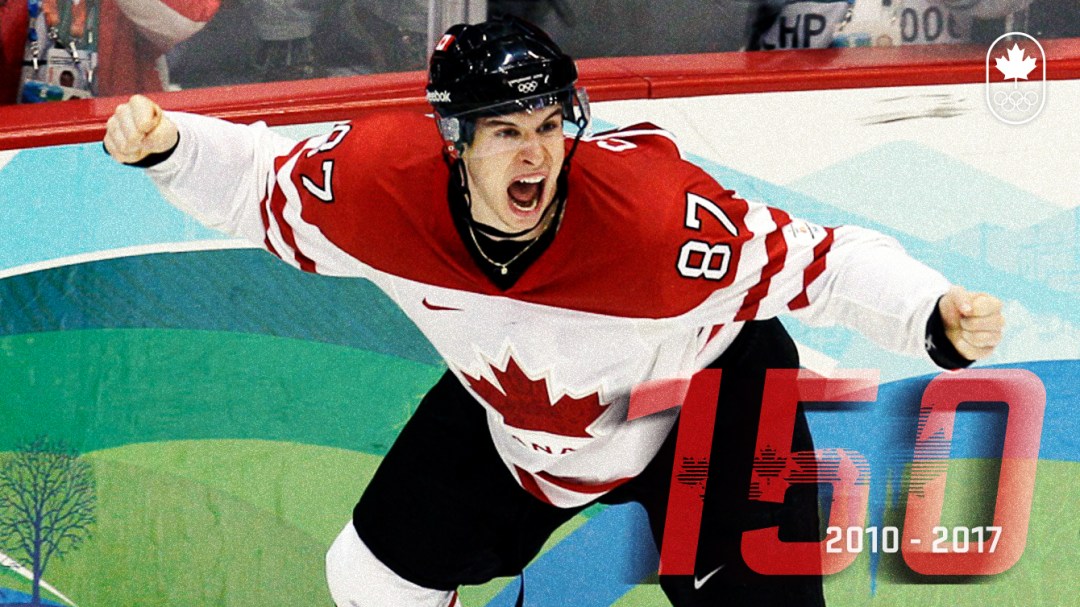150 years of Canadian sport: the 2010s
This is it: the final decade in Olympic.ca’s countdown to Canada’s big 150th birthday.
As our country has grown and evolved, sport has always been there as a source of inspiration and pride. If you need any reminding of what our athletes have accomplished over the last century and a half, just click here.
But now we present the most memorable Canadian sporting moments of the last seven years.
2010 – Finally, First Olympic Gold on Home Soil
After Canada won no gold medals at Montreal 1976 or Calgary 1988, the schedule for Vancouver 2010 was closely scrutinized to see who might end the infamy. The answer came on the second full day of competition in the form of freestyle skier Alex Bilodeau. Second-last down the moguls course, Bilodeau had the best combination of turns, jumps and speed to defeat defending champion Dale Begg-Smith of Australia and instantly created an iconic moment as he celebrated with enthusiastic older brother Frédéric. Canada’s first ever Olympic gold medallist at a home Games made more history at Sochi 2014 when he became the first Canadian man to successfully defend an individual Olympic gold medal.
2010 – Hughes Caps Speed Skating Career with Sixth Olympic Medal
After leading Canada into the Opening Ceremony at Vancouver 2010, Clara Hughes had one of the best races of her speed skating career in her very last time on competitive ice. She won bronze in the 5000m for her fourth career medal on long blades, adding to the bronze she’d won at Salt Lake City 2002 and the gold she’d captured at Turin 2006 where she was also a member of the silver medal-winning team pursuit. All those medals had followed the two bronze she won in road cycling at Atlanta 1996, making her the first – and so far, only – athlete in the world to win multiple medals at both the summer and winter Olympic Games. With six career medals, she is tied as Canada’s most decorated Olympian.
2010 – Persevering Through Personal Tragedy
As the reigning world silver medallist, Joannie Rochette headed to Vancouver 2010 as a top podium contender. But just two days before the short program, her mother passed away suddenly after arriving in Vancouver. Heartbroken, Rochette decided to compete because her mother would have wanted her to fulfill her Olympic dream. Finding a strength she didn’t know she had, Rochette performed a personal best short program before allowing the tears to fall. A solid free skate secured the bronze medal and Rochette’s fortitude resulted in her being named flag bearer for the Closing Ceremony.
2010 – A Half Hour to Remember in Short Track

Charles Hamelin was Canada’s only double gold medallist at Vancouver 2010, winning both within a span of 30 minutes. First came the 500m, in which he shared the podium with bronze medallist teammate François-Louis Tremblay. That led to one of the most famous kisses in Olympic history as girlfriend and teammate Marianne St-Gelais jumped onto the padded rink boards to celebrate with Hamelin. With little time to recover, Hamelin joined younger brother François, Olivier Jean, and Tremblay to win the 5000m relay with a secret strategy dubbed Operation Cobra that saw Tremblay given an extended rest period before skating the last two laps. That gold was the fifth Olympic medal of Tremblay’s career, tying him as Canada’s most decorated male Olympian.
2010 – The Golden Goal
It was a game that 80 per cent of Canadians watched at least some part of and ended in one of those “where were you when” moments. At Vancouver 2010, Canada looked to have the men’s hockey gold medal in hand with less than a minute to play when Zach Parise scored the equalizer for the Americans. Stunned but not stymied, Canada got the last laugh at the 7:40 mark of overtime when Sidney Crosby put home the pass from Jarome Iginla. A coast-to-coast celebration broke out for Canada’s 14th gold medal on the last day of the home Games. In much less dramatic fashion, the Canadian men made it back-to-back gold medals at Sochi 2014.
2010 – Greatest Number of Winter Games Golds Ever
At Vancouver 2010, Canada went from being a country that had never won an Olympic gold medal at home to one that won more gold medals at a single Winter Games than any country before. The record haul of 14 included some indelible highlights:

Maëlle Ricker became the first Canadian woman to win Olympic gold at home with her snowboard cross victory. Tessa Virtue and Scott Moir became Canada’s first ever Olympic ice dance champions. Ashleigh McIvor became the first ever Olympic champion in women’s ski cross. Jon Montgomery won Canada’s second straight gold in men’s skeleton and celebrated with a beer chug. Snowboarder Jasey-Jay Anderson finally won his first Olympic medal, racing through the fog to the top of the parallel giant slalom podium.
2012 – Most Olympic Appearances Ever
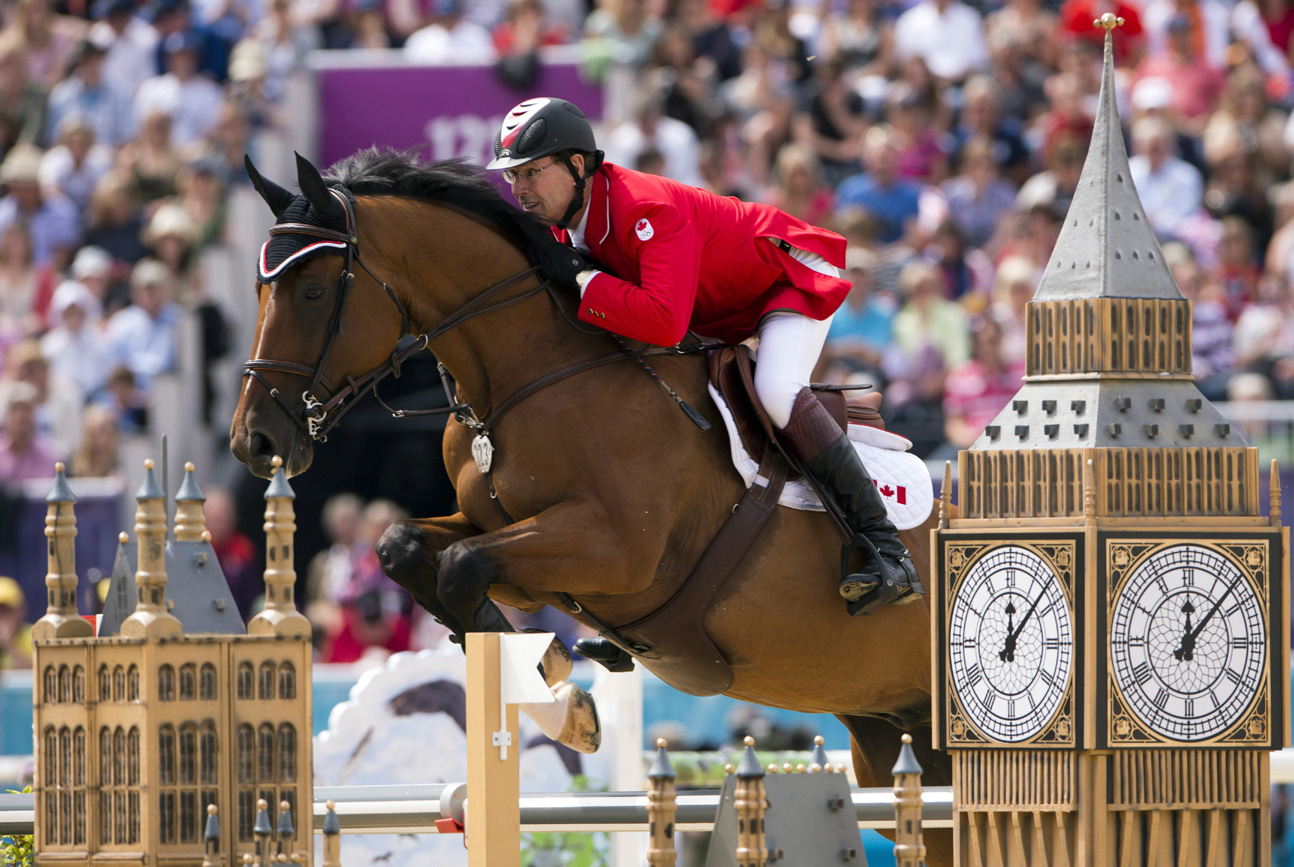
Ian Millar competes in his 10th Olympic Games at London 2012 (CP Photo by Ryan Remiorz)
No one in Olympic history has the longevity of equestrian Ian Millar. From a 25-year-old rookie at Munich 1972 to the 61-year-old who finally won his first Olympic medal at Beijing 2008 to the 65-year-old who became Canada’s oldest Olympian ever at London 2012, Millar competed at 10 Olympic Games with eight different horses over the course of his show jumping career.
2012 – First Canadian to Win Medals at Four Straight Summer Games
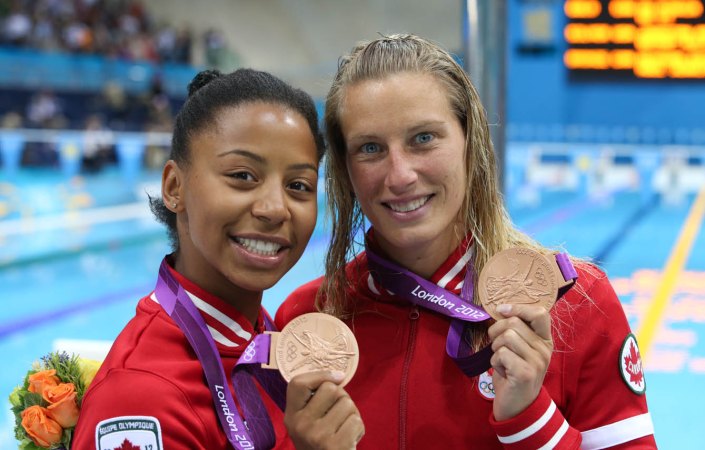
Emilie Heymans and Jennifer Abel, both of Montreal, take the bronze medal in women’s Synchronized 3 metree springboard competition at the 2012 London Olympics, on Sunday, July 29, 2012. THE CANADIAN PRESS/HO, COC – Mike Ridewood
When Émilie Heymans teamed up with Jennifer Abel to win 3m synchro bronze at London 2012, the diver wrote herself into the Canadian Olympic history books. She had started her record streak with a 10m synchro silver at Sydney 2000, partnering Anne Montminy. A 10m synchro bronze with Blythe Hartley followed at Athens 2004. She then won solo silver in the 10m platform at Beijing 2008.
2012 – Canada’s First Summer Olympic Team Sport Medal in 76 Years

At the 2011 FIFA Women’s World Cup, Canada lost all three of its group matches and the defining image was star Christine Sinclair in a mask after breaking her nose. With the team reeling, John Herdman came in as a coach looking for a quick turnaround. At London 2012, a quarterfinal win over the host Brits set up a semifinal with the United States that became Canada’s most talked-about soccer match ever. Sinclair scored a hat trick, but a controversial call helped the US get the goal that sent the game to extra time where the Americans scored the winner. Playing for bronze instead of gold, Canada got a 1-0 victory over France on a goal in the 92nd minute by Diana Matheson. It was Canada’s first Olympic medal in a summer team sport since Berlin 1936. Another bronze at Rio 2016 made the women’s soccer squad the first Canadians to win back-to-back summer team sport medals since 1908.
2012 – Thompson-Willie Makes History with Fifth Medal
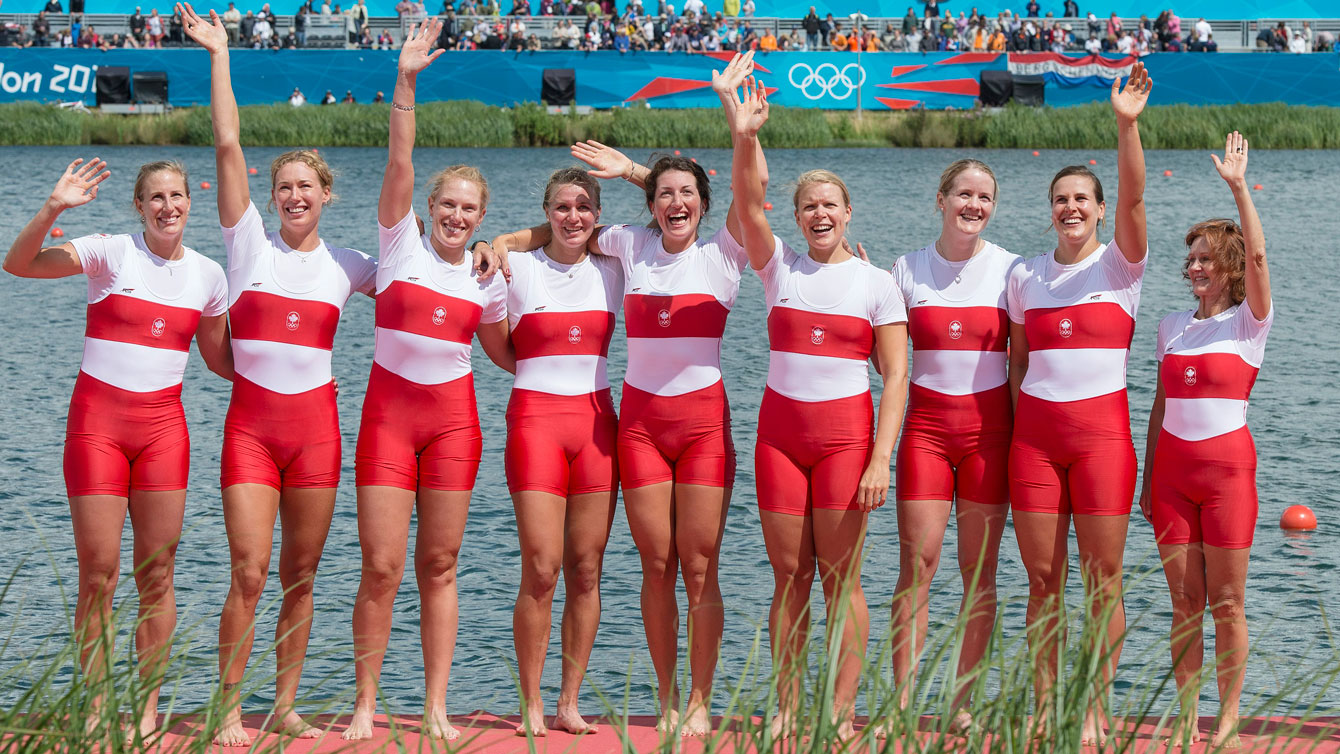
Canada’s women’s eight rowing team (L-R) Janine Hanson, Rachelle Viinberg, Krista Guloien, Lauren Wilkinson, Natalie Mastracci, Ashley Brzozowicz, Darcy Marquardt, Andreanne Morin and Lesley Thompson-Willie at London 2012 after their silver medal performance.
Coxswain Lesley Thompson-Willie reached legendary status at London 2012 where she guided the women’s eight to a silver medal. That was the fifth time she had stood on an Olympic podium since making her debut at Los Angeles 1984 with a silver in the coxed four. She won three straight medals with the eight at Barcelona 1992 (gold), Atlanta 1996 (silver) and Sydney 2000 (bronze). With that fifth medal, Thompson-Willie became Canada’s most decorated female summer Olympian.
2014 – Back-to-Back Bobsleigh Golds
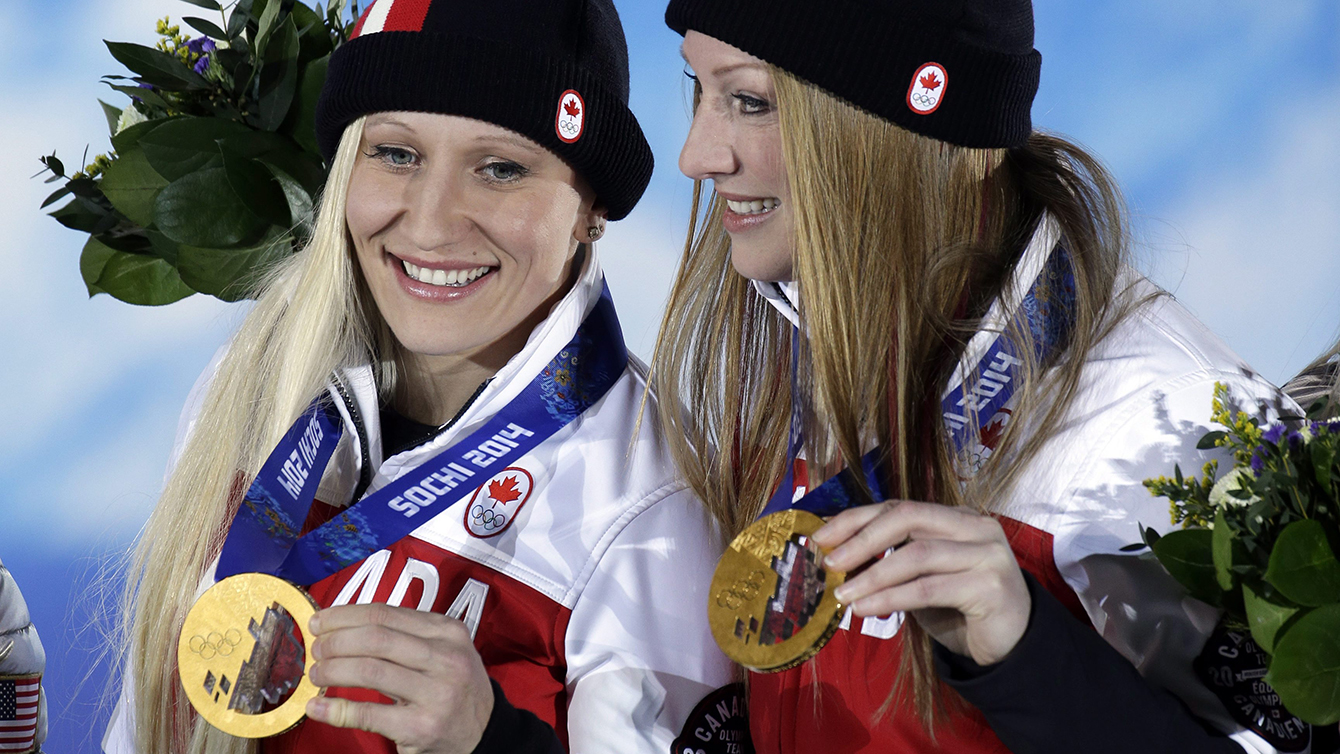
Women’s bobsleigh gold medalists Kaillie Humphries, left, and Heather Moyse of Canada smile during their medals ceremony at the 2014 Winter Olympics, Thursday, Feb. 20, 2014, in Sochi, Russia. (AP Photo/Morry Gash)
At Vancouver 2010, Kaillie Humphries piloted herself and brakeman Heather Moyse to Canada’s first Olympic gold in women’s bobsleigh as part of a 1-2 finish with teammates Helen Upperton and Shelley-Ann Brown. At Sochi 2014, Humphries and Moyse repeated as gold medallists, the first duo to ever do so in women’s bobsleigh. They overcame a 0.11 of a second deficit in the final run to move up from second place. That earned them the honour of being Canada’s Closing Ceremony flag bearers.
2014 – Curling Double Gold
Yes, Canada was the only country to win medals in both curling tournaments at every Games since the sport returned to the Olympic program at Nagano 1998. But while the men had won two straight gold medals, the women hadn’t stood atop the podium since those first Games. At Sochi 2014, Canada’s curling dominance became obvious. The women’s team, skipped by Jennifer Jones, went undefeated en route to the gold medal. The men’s team, skipped by Brad Jacobs, overcame a couple of early losses to reach the gold medal game, which Great Britain conceded after eight ends. For the first time, one country owned both curling gold medals.
2014 – The Post and Poulin
Canada’s Olympic gold medal run in women’s hockey looked like it would be stopped at three in Sochi. Down 2-0 to the United States early in the third period of the final, Canada finally got on the board with just three and a half minutes to play after Brianne Jenner’s shot went off the knee of an American defencemen and into the net. About two minutes later, Canada pulled goaltender Shannon Szabados, who could only watch as the puck was sent towards her empty net. But it hit off the left post, giving Canada one last gasp of hope. Marie-Philip Poulin, who had scored Canada’s only two goals in the gold medal game at Vancouver 2010, tied the game with just 54.6 seconds left on the clock. She came through with the golden goal 8:10 into overtime to give Canada the 3-2 victory. Hayley Wickenheiser, Jayna Hefford and Caroline Ouellette became the first women to ever win gold in the same event at four straight Olympic Winter Games.
2014 – Sister Act
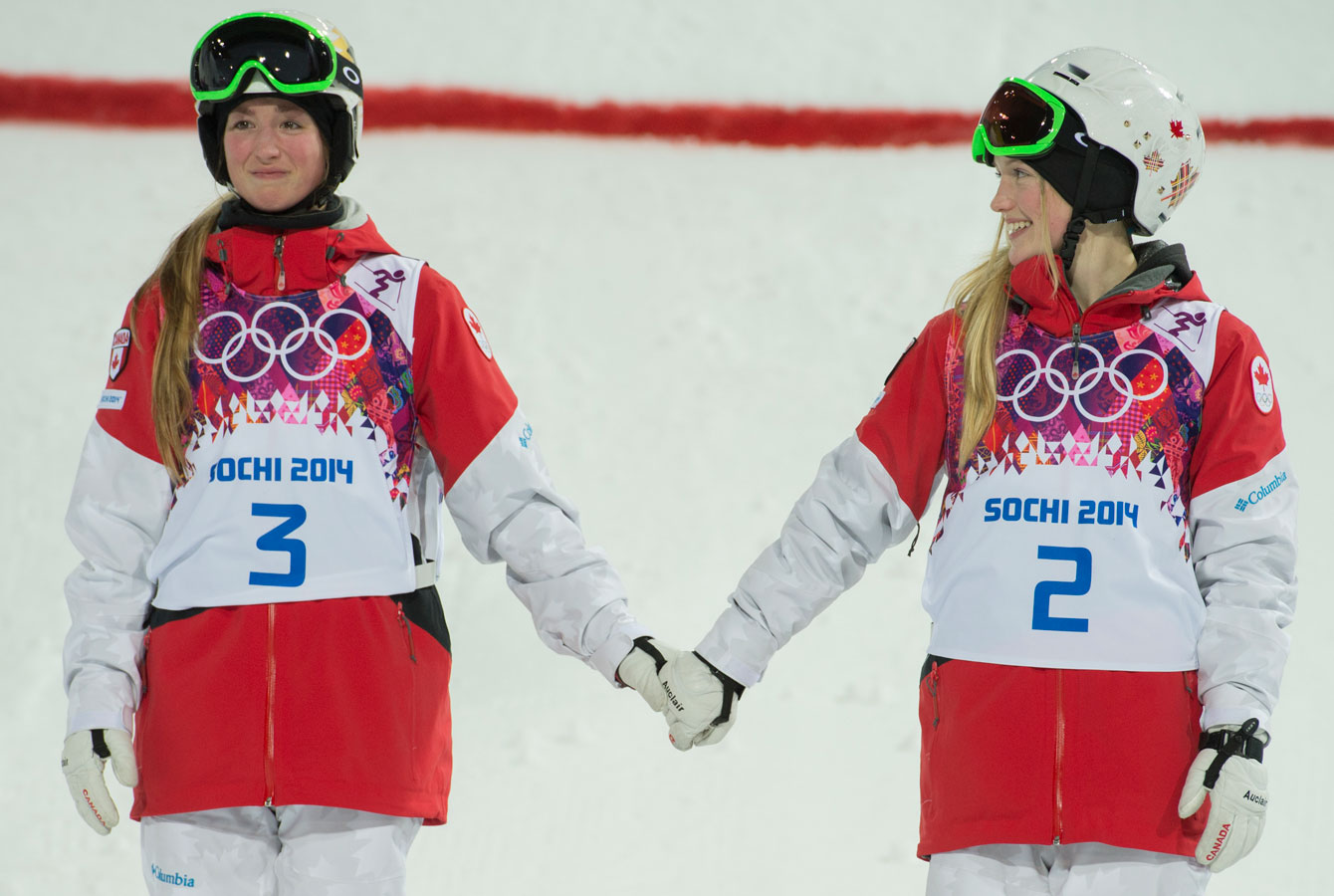
Olympic champion Justine Dufour-Lapointe, looks over at silver medallist sister Chloé before the women’s moguls flower ceremony.
Justine, Chloé and Maxime Dufour-Lapointe made history just by qualifying for the women’s moguls at Sochi 2014, becoming only the third trio of sisters – and the first Canadian trio – to compete in the same individual Winter Olympic event. When they were done, Justine and Chloé had won gold and silver, respectively, making them just the third set of sisters to finish 1-2 in the same Winter Olympic event. As they waited to step on the podium, they held hands to create one of the lasting images of the Games.
2014 – Morrison’s Medal After Junio’s Generosity
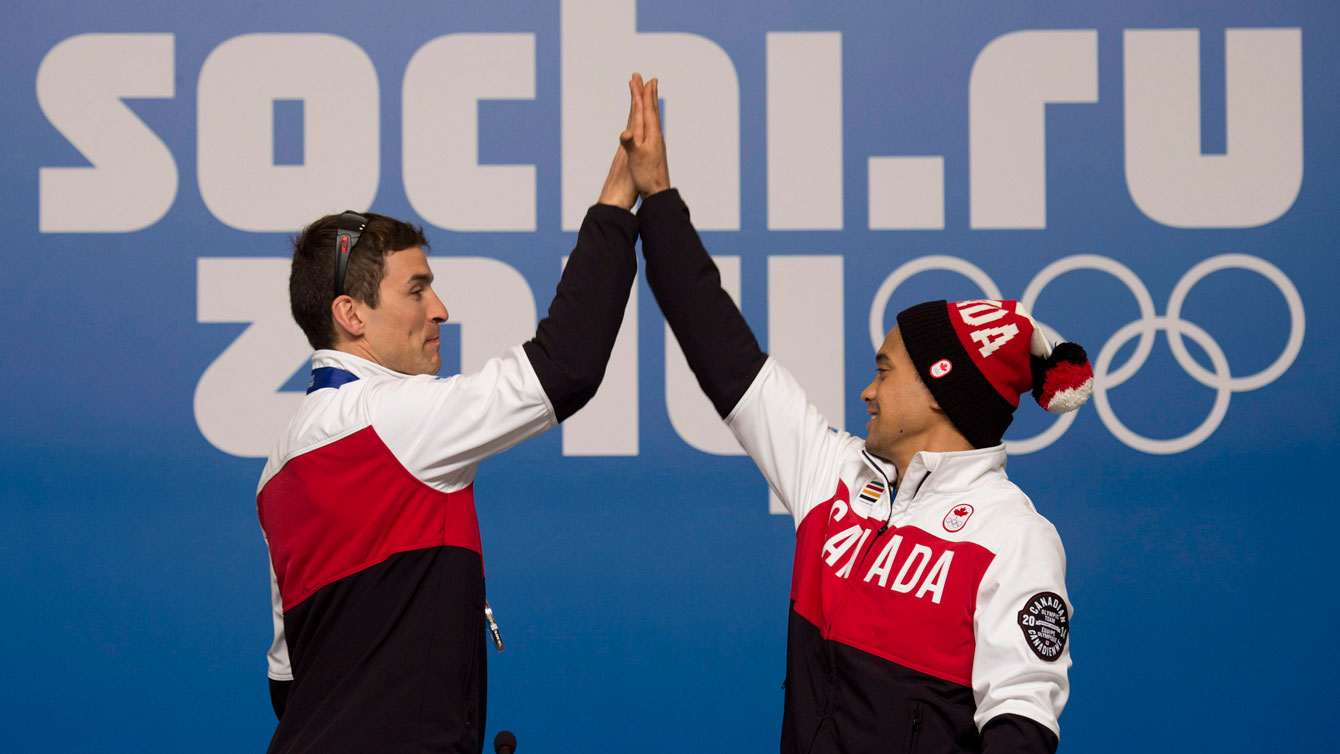
Denny Morrison (left) and Gilmore Junio high-five at Sochi’s Main Press Centre.
Denny Morrison knew how to race the 1000m successfully, winning three straight world championship medals from 2007 to 2009. But at the national trials before Sochi 2014, he fell just steps from the finish and wasn’t named to compete in the distance at the Games. The day before the Olympic race, Gilmore Junio, who had already competed in his best event, the 500m, decided to give his 1000m spot to Morrison because he felt his teammate had the best shot at winning a medal for Canada. Morrison did not disappoint, capturing the silver. Three days later, he added a bronze medal in the 1500m. In May, Junio was gifted a commemorative crowdfunded medal as a thank you from fans.
2014 – Bouchard’s Breakthrough Season
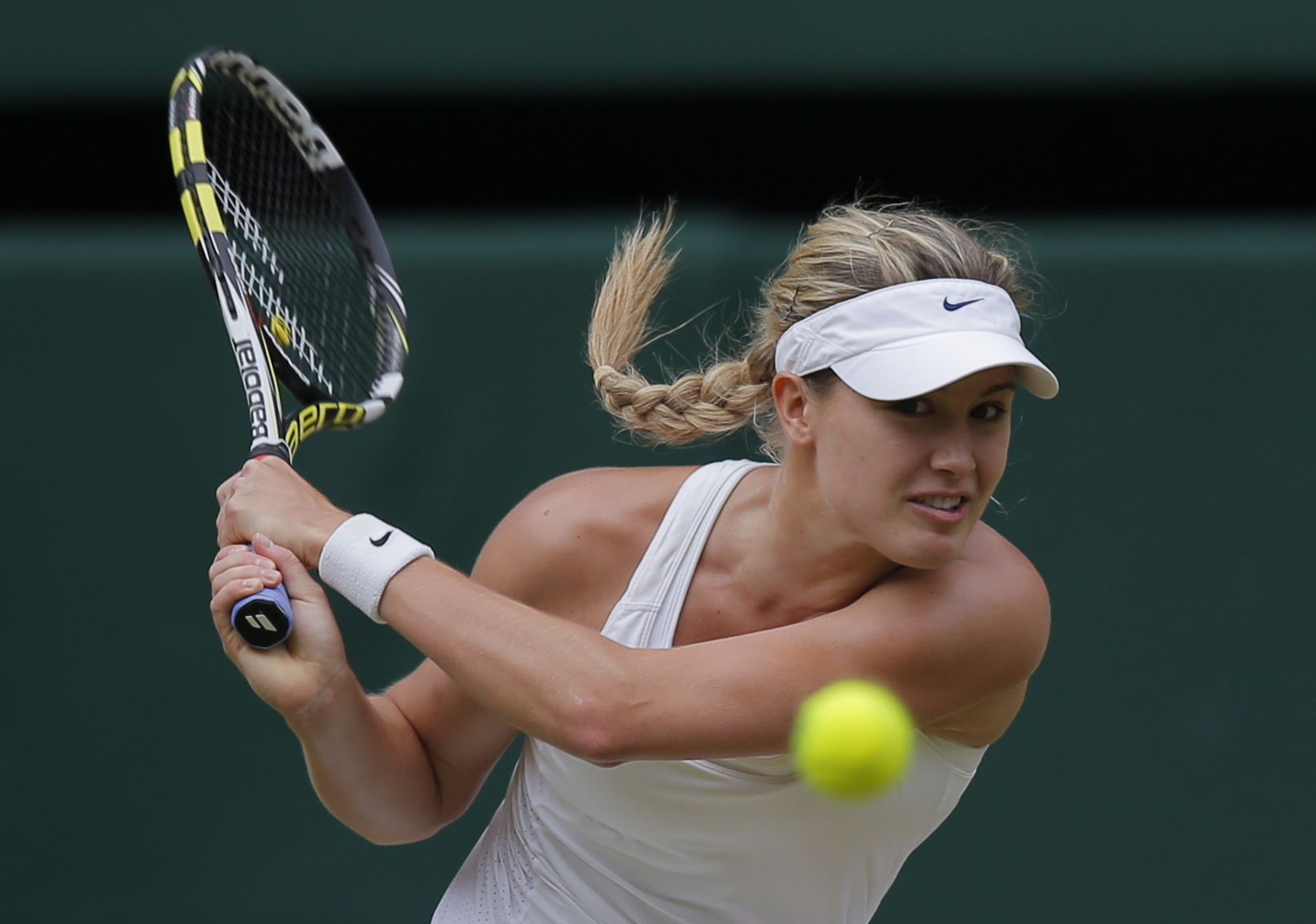
Eugenie Bouchard of Canada plays a return to Petra Kvitova of Czech Republic during their women’s singles final at the All England Lawn Tennis Championships in Wimbledon, London, Saturday, July 5, 2014. (AP Photo/Pavel Golovkin)
Eugenie Bouchard started 2014 ranked 32nd in the world. Before the year was done, she had become the first Canadian singles player – male or female – to be ranked in the top five. She reached the semifinals of the year’ first Grand Slam, the Australian Open. In May, she won her first career WTA singles title in Nürnberg, Germany before advancing to the semifinals of the French Open. A history-making moment followed at Wimbledon where she became the first Canadian singles player to compete in a Grand Slam final.
2015 – King of the Moguls
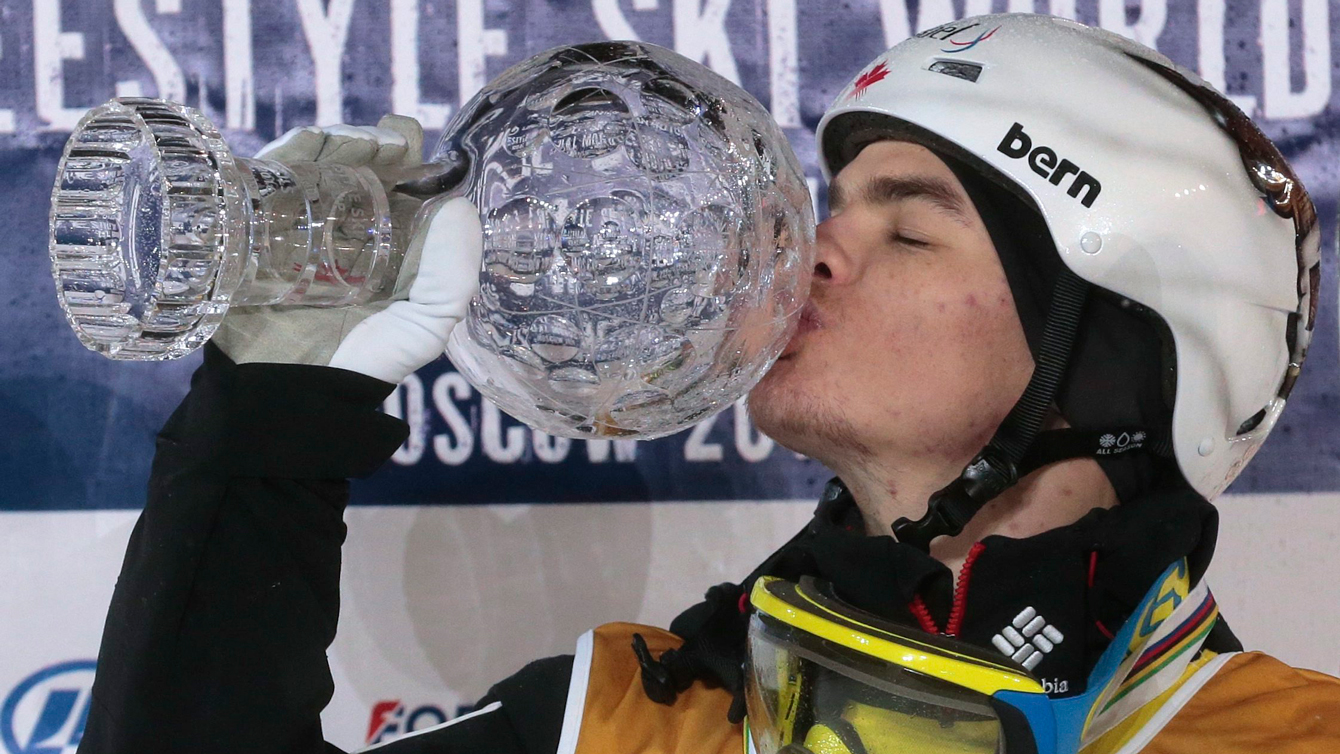
Canada’s Mikael Kingsbury kisses the Crystal Globe trophy after winning the men’s dual moguls at the World Cup freestyle skiing in Moscow, Russia on March 5, 2016. (AP Photo/Ivan Sekretarev)
In December 2015, Mikaël Kingsbury finished first in the dual moguls in Ruka, Finland. It was his 29th career victory in just 62 World Cup starts, making him the winningest moguls skier in the circuit’s history. Since then, Kingsbury has brought his career total to 42 wins in 80 starts, a consistency that has made him the winningest freestyle skier in World Cup history. Since 2011-12, Kingsbury has won six straight Crystal Globes as the overall World Cup champion of freestyle skiing.
2016 – Brooke Henderson Becomes Major Star
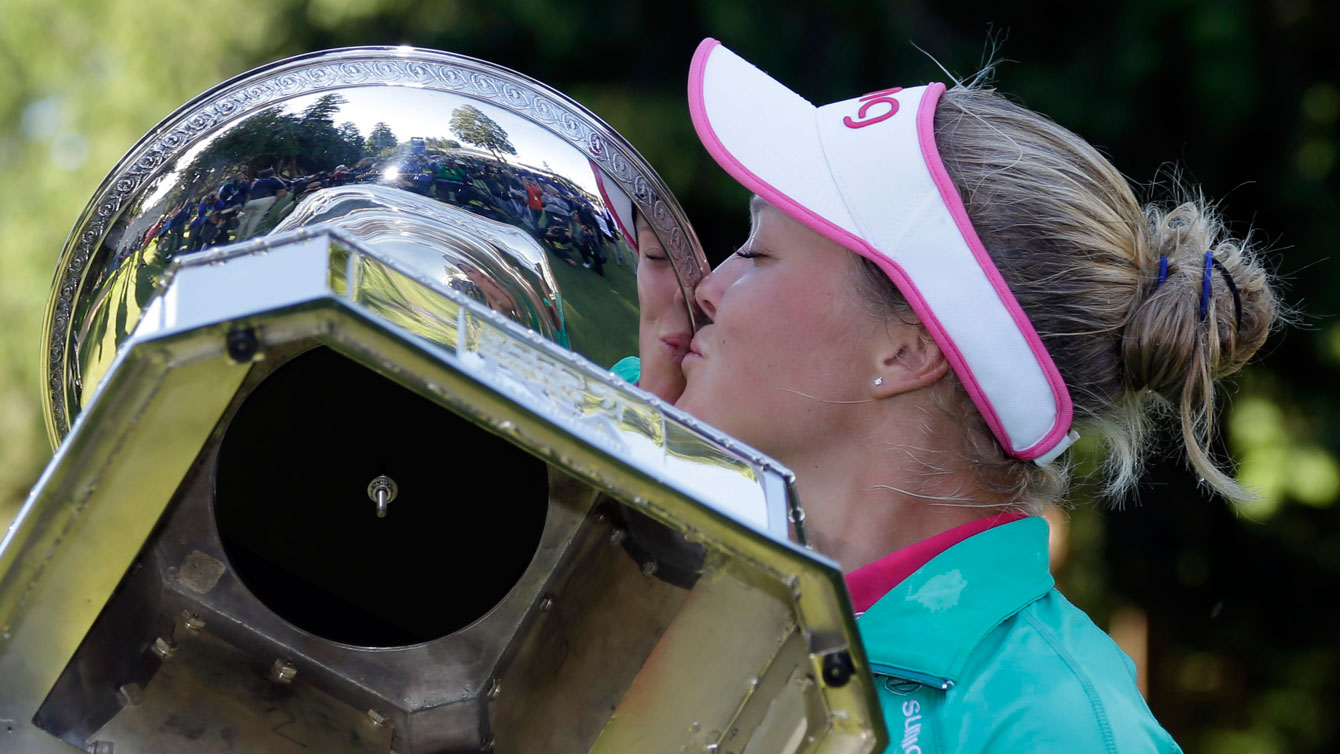
Brooke Henderson kisses the Women’s PGA Championship trophy after winning her first major on July 12, 2016.
When Brooke Henderson won the Women’s PGA Championship, she became the first Canadian woman to win a golf major in 48 years. Still a couple months shy of her 19th birthday, she was the second-youngest women’s major winner ever and the youngest winner of that tournament in its 61-year history. The victory helped her rise to number two in the world rankings, the best ever by a Canadian golfer – male or female.
2016 – Canadian Women Rule the Pool
Heading into Rio 2016, it had been 20 years since a Canadian woman had won an Olympic swimming medal. That drought ended in a big way. The Canadian swimming team won six medals in Rio, its third-best total ever, all by women. Penny Oleksiak put her name on four of them, highlighted by her tie for gold in Olympic record time in the 100m freestyle. Canada’s youngest Olympic champion ever, she became the first Canadian athlete to win four medals at a single summer Games. She had already won silver in the 100m butterfly and a pair of bronze medals as the anchor of the 4x100m and 4x200m freestyle relays. Backstrokers Kylie Masse and Hilary Caldwell won bronze medals in the 100m and 200m events, respectively. All told, 11 of Canada’s 19 female pool swimmers headed home with hardware.
2016 – Two-Time Trampoline Queen
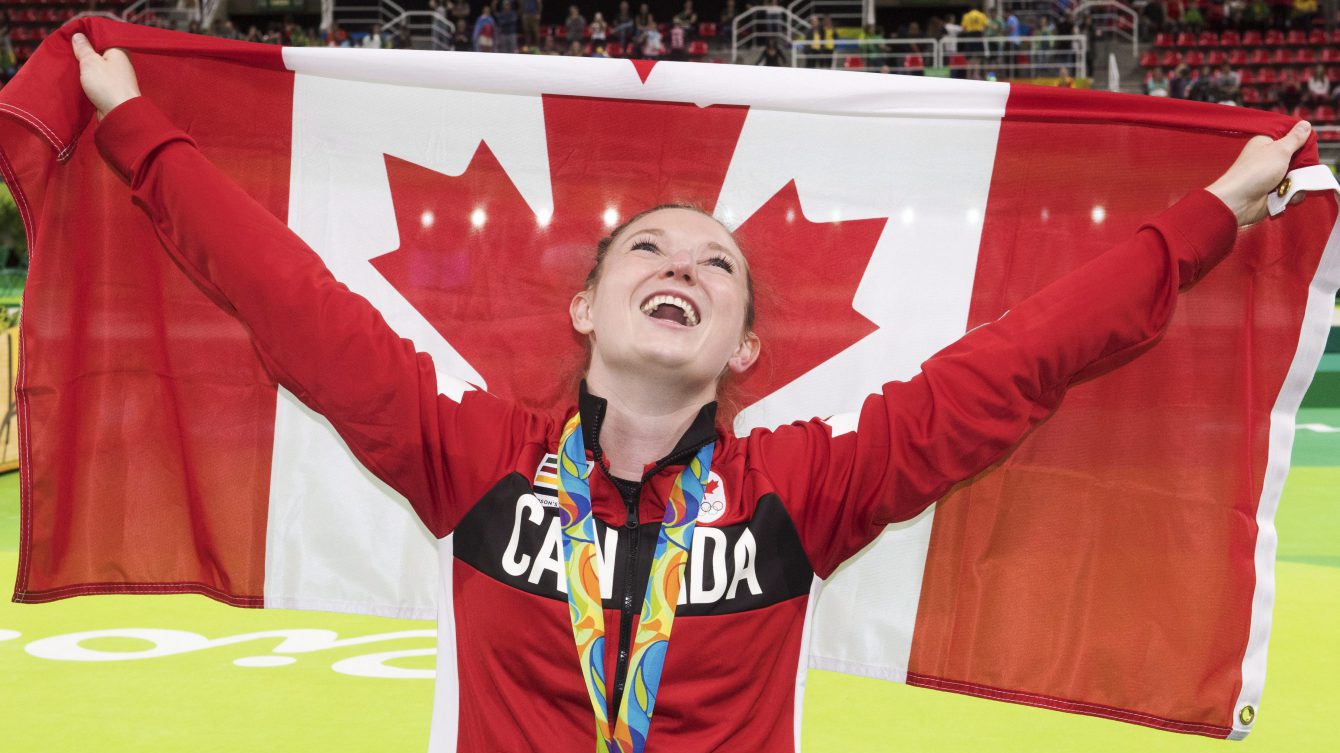
Canada’s Rosie MacLennan, from King City, Ont., celebrates after winning the gold medal in the trampoline gymnastics competition at the 2016 Summer Olympics Friday, August 12, 2016 in Rio de Janeiro, Brazil.THE CANADIAN PRESS/Ryan Remiorz
Karen Cockburn had stood on the podium at the first three Olympic Games to feature trampoline. Rosie MacLennan continued that streak at London 2012, winning Canada’s first Olympic gold in the sport with the most technically difficult routine of the competition. Four years later, MacLennan served as Canada’s Opening Ceremony flag bearer at Rio 2016 and then put her name in the history books as the first trampolinist to win back-to-back Olympic gold medals. She also became the first Canadian athlete to successfully defend an Olympic title at the summer Games and the first Canadian woman to win two gold medals in an individual event at the summer Games.
2016 – Return to Track and Field Glory
When Rio 2016 came to a close, Canadian track and field athletes had won six medals, the country’s best Olympic total in the sport since Los Angeles 1932. High jumper Derek Drouin was Canada’s first Olympic champion in a field event since those Games, becoming just the sixth high jumper to ever win Olympic gold with a clean sheet. Andre De Grasse was the first Canadian sprinter to win three medals, taking silver in the 200m and bronze in the 100m and 4x100m relay, becoming part of the bromance beloved around the world with Jamaican superstar Usain Bolt. Brianne Theisen-Eaton and Damian Warner each won a bronze medal, she in the heptathlon and he in the decathlon, to make Canada the only country to win medals in both combined events. All that success came on the heels of a best-ever haul of eight medals at the IAAF World Championships in 2015, proving that Canada was no longer an afterthought in the biggest sport on the Olympic program.
2016 – A Tale of Two Tennis Stars

Less than two weeks into 2016, Daniel Nestor hit a major milestone on the ATP World Tour, becoming the first player ever to win 1000 career doubles matches. Only three players had ever reached that mark in singles play. It took Nestor 23 years and 33 different partners to achieve the record, garnering much respect from his competitors.
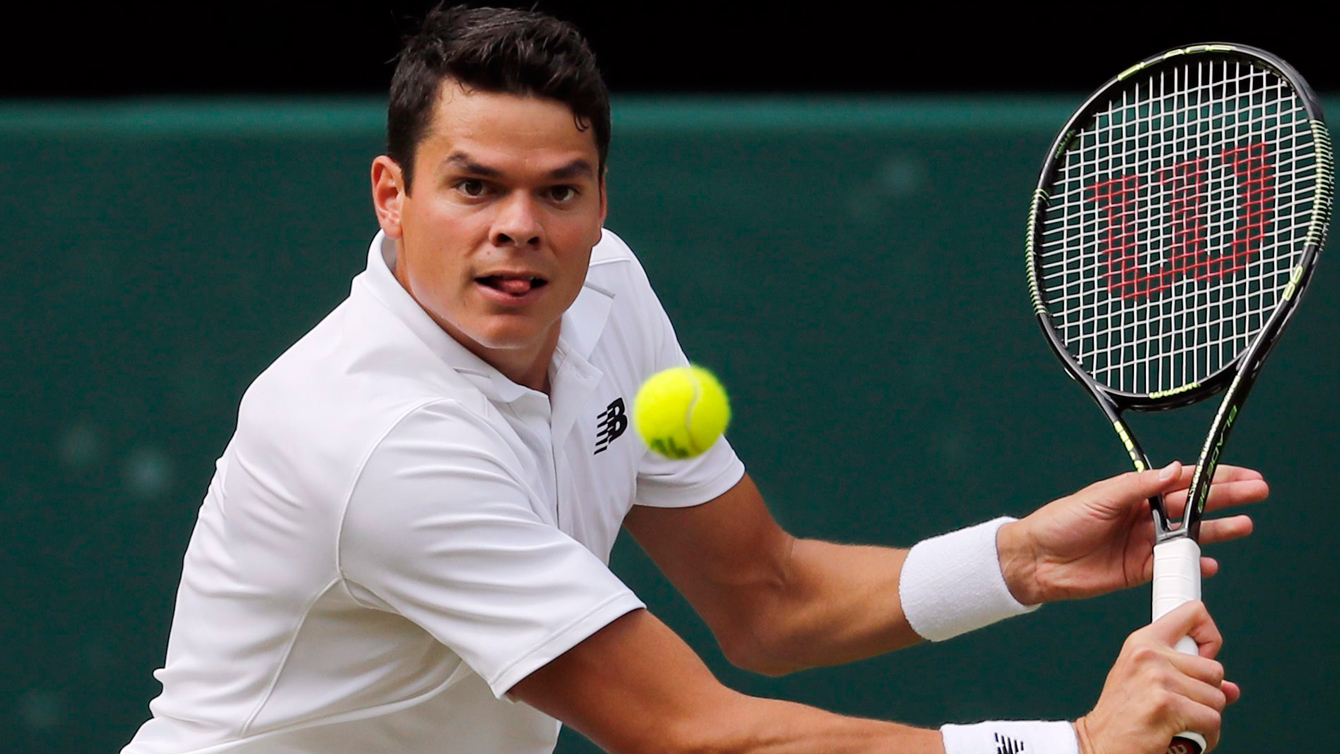
Milos Raonic of Canada returns to Andy Murray of Britain during the men’s singles final on the fourteenth day of the Wimbledon Tennis Championships in London, Sunday, July 10, 2016. (AP Photo/Ben Curtis)
Milos Raonic made his own history at Wimbledon when he became the first Canadian man to play in a Grand Slam singles final. It took a five-set victory over legend Roger Federer to get there, where he lost to home favourite Andy Murray. It helped him move up the rankings to third in the world before the year was out, the highest any Canadian singles player had ever reached.

